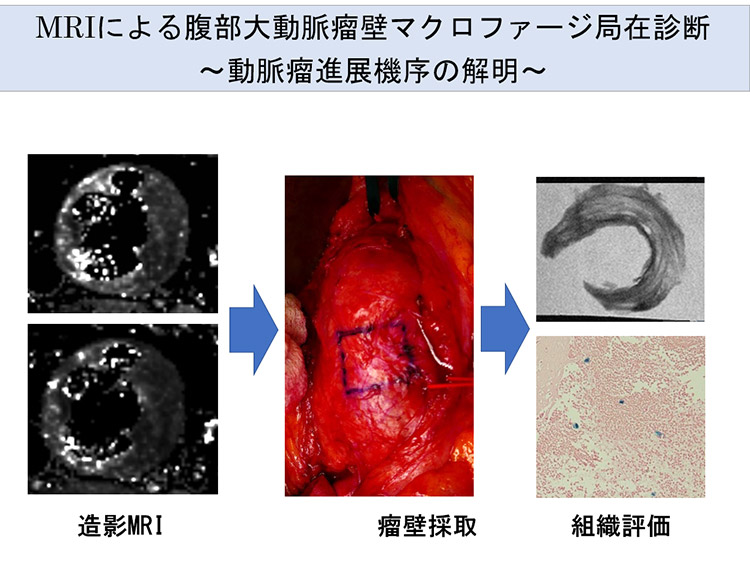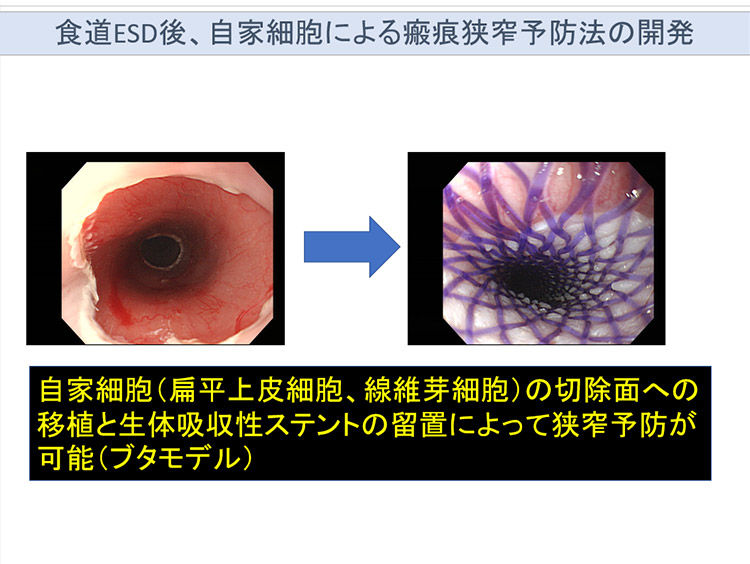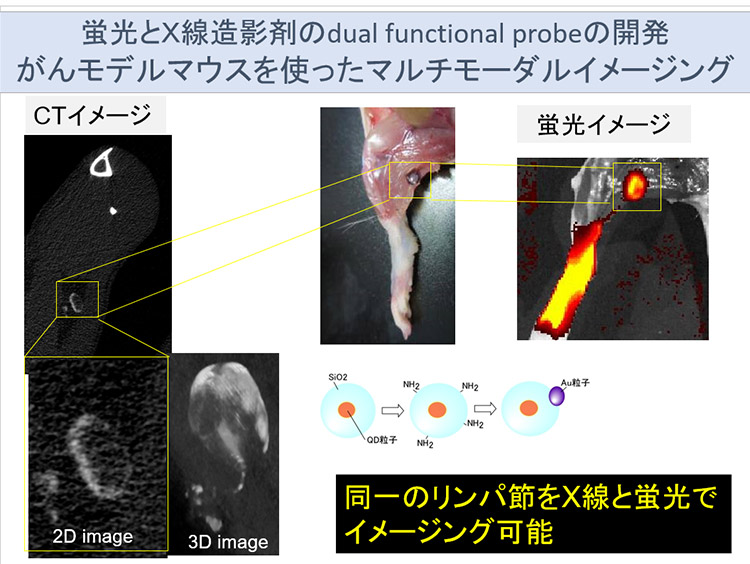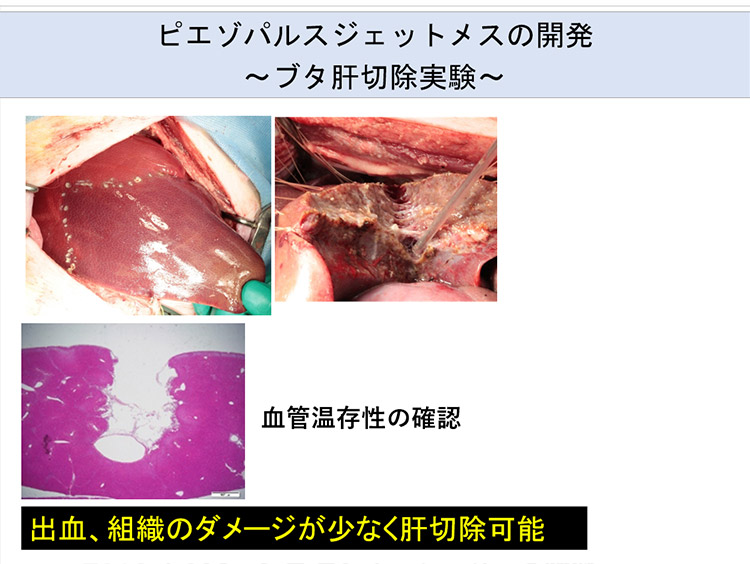大学院説明会
特設ウェブサイト
- トップ
- インタビュー
- 亀井 尚
充実した研究環境で、
基礎・臨床研究を通して
治療成績を上げることを目指す
若手外科研究者を求む
Seeking young surgical researchers
who pursue better therapeutic outcomes
through basic and clinical research
in a well-rounded research environment
- 医科学専攻
- Medical Sciences
- 消化器外科学分野 教授
- Department of Gastroenterological Surgery Professor
- 亀井 尚
- Takashi Kamei
- 2020.06.04
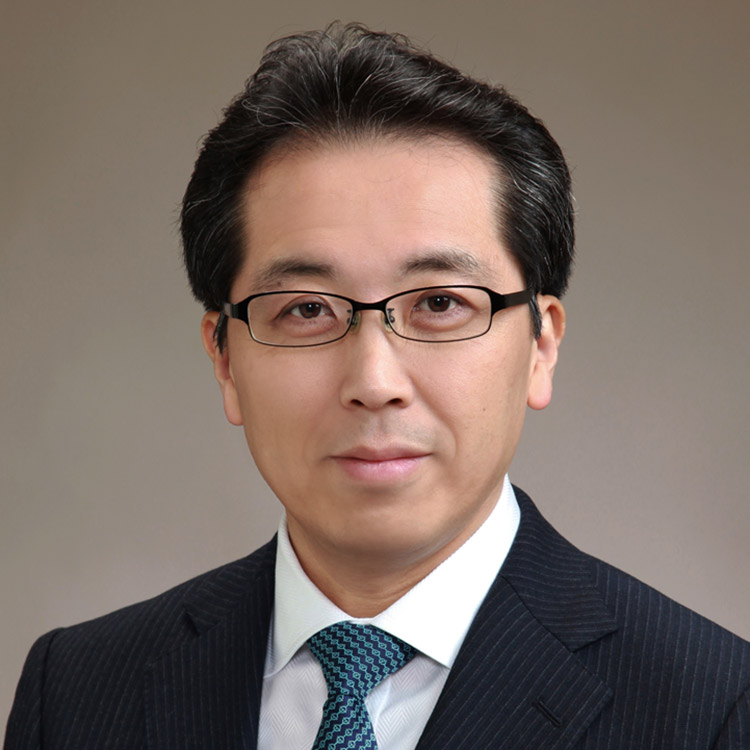
研究の本質は新規の知見を得て、外科学の進歩に寄与すること
The essence of the research is acquiring new knowledge and contributing to the advancement of surgery.
●研究の概要を教えてください
外科は手術を手段とした治療学という側面が大きい分野ですが、当講座の守備範囲は、消化管、肝胆膵、血管、移植と広く、また、扱う疾患も消化器がん、炎症性疾患、臓器不全、動脈瘤などの形態異常など多岐にわたっています。研究の目的はズバリ、「治療成績を上げること、それにつながる基礎研究、臨床研究を行う」で、そのために疾患の成り立ちや背景因子を明らかにするベーシックな研究や、新規の診断法、治療法開発と検証、侵襲に対する生体反応および代謝栄養の研究、これらをもとにした周術期管理法など、様々な研究を進めています。現代の外科は周辺の学問領域と切り離すことができません。遺伝子工学、細胞治療、再生医療などを外科にどのように応用するかも大切になっています。現在、精力的に進めている研究に、自家細胞、羊膜細胞を用いた再生医療の外科応用や遺伝子多型解析による食道がんリンパ節転移の予測などがあります。疾患に対する新規の知見を得て、科学的な裏付けによる外科学の進歩に寄与することが研究の本質と考えています。現在、東北大学外科は講座再編により旧第1外科、第2外科が一つの外科となり、消化器外科は血管外科、移植外科を含む大きな外科講座となっており、海野倫明教授と2名で主催しています。
●What is your research summary?
Although surgery has a large aspect of therapeutics by means of surgical operation, our department covers a wide range of areas including the gastrointestinal surgery, hepatobiliary-pancreatic surgery, vascular surgery and organ transplantation.
We also deal with various diseases such as gastrointestinal cancer, inflammatory diseases, organ failure, and morphological abnormalities such as aneurysms.
The aim of the research is to “improve the therapeutic outcomes and conduct basic and clinical research that will lead to better outcomes.” To this goal, we have been conducting basic research to elucidate the origins and background factors of the diseases, research to develop and validate new diagnostic and therapeutic methods, research on biological responses to invasion and metabolic nutrition, and developing perioperative management methods based on the outcomes from those researches. Modern surgery cannot be separated from the academic disciplines in neighboring fields. How we apply genetic engineering, cell therapy and regenerative medicine to surgery has also become important. Currently, we are actively working on surgical applications of regenerative medicine using autologous cells and amniotic membrane cells, and predicting esophageal cancer lymph node metastasis based on gene polymorphism analysis. We believe that the essence of our research is to contribute to the advancement of surgery by obtaining new knowledge on diseases with scientific evidence. At present, the Division of Surgery at Tohoku University has been reorganized, and the former Surgery Div.1 and Div.2 have been merged into a single multidiscipline surgery division, and then, the Department of Gastroenterology has become a large Department including Vascular Surgery and Transplantation Surgery group, which is run by me and Professor Michiaki Unno.
チームの団結力と分け隔てない関係が特徴
Cohesive team work and open communication
●研究室はどのような雰囲気ですか?
外科講座が一つになったことから、ここ数年は、1学年10-20名ほどの大学院生が入学してくれており、全体として大きい教室になっています。出身大学は様々ですが、教室での生活はすべて同じです。臓器別に研究グループがあり、それぞれテーマがありますが、大学院生は自分の興味にしたがって自由にグループを選ぶことができます。研究によっては、基礎医学の教室へ出向して研究を進めたり、臨床と並行して研究を行うこともあります。指導医、先輩、後輩と分け隔てなく相談、情報交換できる環境で、孤独感を持たずに楽しく仕事ができると思います。定期的な研究相談会を通して、教室全体で、大学院生の研究進捗状況を確認するとともに、課題、問題点に対する異なる視点からのアドバイスを受けながら、研究をまとめ、成果の発表、論文化を進めます。また、最近は女性外科医が増えており、大学院生のあいだに出産、子育てを経ることも稀ではありません。先輩ママ医師の助言を受けながら、ライフイベントと研究を両立させています。臨床の教室ですから、診療のエフォートが比較的高い一方で、チームとしての団結力は研究面でも十分発揮されていると感じます。
●What is the atmosphere in your department?
Since the surgery division became only one, we have had about 10-20 graduate students per academic year enrolled in the last few years, making our department a larger one as a whole.
Although the universities students come from are different, all have the same life in the department. We have different research groups for different organs, each with its own theme, and graduate students are free to choose a group according to their own interests. Depending on the content of the research, you may be seconded to a basic medicine department to conduct research, or you may conduct research along with clinical work. In an environment where everybody can consult and exchange information with supervisors, seniors and juniors without hesitation, I think you will be able to enjoy your work without any sense of isolation.
The progress of the graduate students’ research is confirmed in the department as a whole through regular research consultation meetings. Then, students summarize their research, present their outcomes, and write a paper while receiving advice on issues and problems from different perspectives.
In addition, the number of female surgeons is increasing these days, and it is not uncommon for graduate students to go through childbirth and child rearing while they are studying in the department. They are balancing research with their life events with the advice of senior mum doctors. While we are relatively more involved in clinical practice as a clinical department, I feel that the cohesiveness of the team is also fully demonstrated in their research.
研究を通して科学的なものの見方を身に付けた外科医に
Become a surgeon with a scientific perspective through research
●学生にどのようなことを期待しているかなども含め、進学希望者へのメッセージをお願いします
大学院では、研究を通して科学的なものの見方を身に付けた外科医、いわゆるAcademic Surgeonになってもらいたいと思います。おそらく、これまでは外科研修医として手術や化学療法、周術期管理の修練に明け暮れていた生活だと思いますが、それらはこれまでに誰かがその研究を行い、できあがってきた治療体系だといえます。それをひたすら模倣するだけではなく、研究の場に自分を置くことで今までと違う視点が養われると、自分の経験も含めて強く感じます。日常臨床では、このやり方の裏付けは何?教科書の記載が本当にそうか?と疑問を持つ場面も多々出てきます。術後患者さんの経過がなぜそうなるのか、がんの生物学的振る舞いの多様性とがん克服のために解明しなければならない問題は何か、放射線治療、化学療法、免疫療法などと外科治療を組み合わせた集学的治療のエビデンス創出など、すべて研究による科学的裏付けを持つことで進歩します。私の尊敬する先輩外科医が「演奏家になるな、作曲家になれ」とおっしゃっていて非常に感銘を受けたことがあります。演奏力は基本的なスキルとして身に付けなければなりませんが、それで終わらずに、研究でも成果を出す、できれば治療体系を変えるような名曲を残すことを期待します。その後の外科医人生でも、大学院で培ったリサーチマインドを持つ外科のリーダーとして活躍してもらいたいと切に思っています。
●Please give a message to prospective students.
In graduate school, we would like you to become a surgeon, what we call, an Academic Surgeon, who has developed a scientific way of looking at things through research.
Perhaps you have spent your life training in surgery, chemotherapy, and perioperative management as a surgical resident by now, but it can be said that these therapeutic systems have been established by someone else who did the research in the past. I strongly feel, also from my own experience, that putting yourself in the place of research, rather than just replicating therapeutic systems, will help you develop a different perspective.
In daily clinical practice, there are situations where we come across the questions; what is the supporting evidence for this approach? Is that true what the textbook says? etc.
Why the course of post-operative patients is like this, what issues should be elucidated to understand the diversity of the biological behavior of cancer and overcome it, and How generate evidence for multidisciplinary treatment combining radiotherapy, chemotherapy, immunotherapy, etc. with surgical treatment, all of which can be progressed by having scientific support from research itself.
I was once very impressed by the words of a senior surgeon I respected, “Don’t be a performer, be a composer”. Performance skills must be acquired as a basic skill, but I hope that you will not stop there, but will also accomplish something in your research and hopefully leave behind a masterpiece that will change the therapeutic system. I sincerely hope that, in your later life as a surgeon, you will continue to be a leader in surgery with the research mindset you developed in graduate school.
それぞれの立場でリーダーとして多岐にわたる活躍
Various contributions as a leader in each position
●修了後はどのような進路がありますか?また、修了生はどのように活躍していますか?
多くは外科医として臨床現場に戻り、第一線で活躍することになりますが、その後、大学スタッフとして帰学、留学(大学院修了後、すぐに留学するケースも多くあります)、関連病院での勤務医、開業するなど進路は様々です。数は少ないですが、大学院での学問の面白さから基礎医学の研究医へ転向する方もいます。その後の活躍は多岐にわたり、大学や研究所のスタッフとして、日本・世界の外科学を牽引している先生、教育病院でのカリスマ的指導者、消化器外科医として地域医療に大きく貢献している先生、国や県の医療行政を担う人材など多くの先輩がそれぞれの立場でリーダーとして活躍しています。
●What career paths are available after completing the program? What are the graduates doing well?
Many return to the clinical field as surgeons and work at the front line, but there are also a variety of career paths afterwards, such as returning to school as a faculty member at a university, studying abroad (in many cases, such students study abroad right after completing graduate school), working at an university related hospital, or starting a clinic. Although there are a few, some students find the academics at graduate school intrigued by research and switch to becoming research physicians in basic medicine.
In fact, there are many Alumni who are leading the field of surgery in Japan and the world as university and research institute staff members, charismatic leaders in educational hospitals, gastroenterological surgeons who are greatly contributing to the community health care, and those who are in charge of national and prefectural health care administration, etc., all of whom are active as leaders in their respective positions.
研究に専念する3年間
Three years dedicated to research.
●病院や企業に勤務しながらの修学は可能でしょうか?
多くの大学院生は3年間研究に専念する形で学位を取得します。時間的な制約から、病院や企業に勤めながらの修学は難しいと考えています。一方、東北大学医学部はいくつかの病院(大崎市民病院、いわき市医療センター、がん研有明など)と連携大学院協定を締結しており、先方の病院に勤務しながら、そこで研究を進め、東北大学の学位取得が可能になっている場合もあります。また、数は少ないですが、企業からの派遣で大学院を修了した方もいらっしゃいますので、適宜ご相談ください。
●Is it possible to study while working at a hospital or in a company?
Many graduate students complete their degree by dedicating three years to research. Due to time constraints, it is difficult to study while working at a hospital or in a company. On the other hand, Tohoku University School of Medicine has collaborative graduate school agreements with several hospitals (Osaki City Hospital, Iwaki City Medical Center, Cancer Institute of Japan, etc.), and in some cases it is possible to complete his/her degree from Tohoku University while working and conducting research there. There are also a few students who have completed their graduate studies on dispatch from companies. For more information, please contact us.
「門戸開放、研究第一、実学尊重」をモットーに、強い思いを持つ研究者が多く在籍
Under the motto of ‘Open Doors’, ‘Research First’, and ‘Practice Oriented Research and Education’, many researchers with strong passions are at Tohoku University.
●東北大学の良いところは?
やはり総合大学としての利点と、施設や予算を含めた大学規模の大きさだと思います。また、門戸開放、研究第一、実学尊重を3大モットーにしているところでしょうか。総合大学としては、医工学研究科、加齢医学研究所をはじめ、ほかの研究科、研究所、分野との共同研究がそう遠くないキャンパス内で数多く行われています。共同研究を進める最大の利点は、東北大学には様々な領域の第一人者と言える研究者が多く在籍していることであり、それぞれが研究を通して社会の進歩に寄与したいという純粋かつ強い思いをもっている研究者であることも大きいと思います。次世代医療は医工学抜きには発展できませんが、もともと工学系は東北大学の強みでもあり、工学研究科、材料研究所や流体研究所との共同研究をこれまでも行ってきました。また、東北メディカルメガバンク機構は、約15万人のゲノム解析を終了し、これまでにないビッグデータを蓄積していますし、大学病院には臨床研究推進センターCRIETOが設置され、大学院生の研究のシーズを臨床応用するサポート体制も充実しています。仙台は気候的にとても住みやすく、国際交流も盛んで、研究環境はとても充実しています。
●What are the advantages of Tohoku University?
I think being a comprehensive university and its largescale including facilities and budget, are the advantages which make Tohoku University such a great place to study. In addition, the three mottos of the university ‘Open Doors’, ‘Research First’, and ‘Practice Oriented Research and Education’ are also good points.
As a comprehensive university, we have a lot of collaborations with other Universities, research institutes and faculties, including the Graduate School of Biomedical Engineering and the Institute of Development, Aging and Cancer, which are not far from our campus.
One of the greatest advantages of collaborations is that many leading researchers in various fields are available at Tohoku University, and I think it is also significant that each of them has a genuine and strong desire to contribute to the progress of society through their own research. Medicine in the next generation cannot develop without medical engineering. However, Tohoku University has been strong in the field of engineering, and we have actually conducted collaborative research with the Graduate School of Engineering, the Institute for Materials Research, and the Institute for Fluid Dynamics so far. In addition, the Tohoku Medical Megabank Organization has completed genome analysis of about 150,000 people and accumulated unprecedented big data, and CRIETO, the Center for the Advancement of Clinical Research, has been established at the University Hospital to support the clinical application of graduate students’ research seeds. Sendai is a very comfortable place to live in terms of climate and international exchange, and has a very good research environment.
●興味を持たれた方へ
興味を持たれた方は、ぜひ見学にいらしてください。教室の雰囲気や指導医からの熱い研究マインド、外科医としての将来像を聞くことができます。
●For those interested in our lab
If you are interested, please come and visit us. You’ll hear about the atmosphere in the department, the passionate research mindset from the supervisors, and the future vision as a surgeon.
心を震わせる医学の歴史にのめり込む
年齢を重ねてくると、俄然、歴史に興味がわいてくる人たちが多いと思います。私もご多分に漏れず、日本史、世界史の本を渉猟し、歴史の舞台となった旧跡を訪ね、昔は全く読まなかった歴史小説も読むようになりました。その中でも、特に医学史は自分の仕事に関係した領域であり、当時の医療者の苦労が容易に想像でき、これが現代の医療につながっていることから、とても面白く、“はまって”います。外科手術が内臓に進出してきた、いわゆる近代外科は150年ほど前から始まったものですが、ビルロートによる世界初の胃切除成功例(1881年、ウィーン大学)は外科学史上、燦然と輝く偉業です。一昨年、国際学会でウィーンを訪ねた時、ホルマリンで保管されている切除胃の標本を、実際に見ることができ、非常に感銘を受けました。150年たっても、ほとんど同じ手技が行われており、ヨーロッパから遠い日本の外科医の心を震わせるほどの仕事を成し遂げた先人の偉大さをあらためて考え、そのような仕事ができたならどんなにか幸せな一生なのだろうと思っています。若い研究者にはそのような充実感をもった幸せな人生を送ってもらいたいと強く思っているのですが、さて、自分は何をしているのか、恥ずかしながら迷走中です。
Immerse in a mind-blowing history of medicine
When people get older, I think many of us suddenly become more interested in history. I was not an exception. I have been wading through books on Japanese and world history, visiting historical sites and reading historical novels that I had never read before. The history of medicine is particularly interesting and "addicting" to me because I can easily imagine the hardships of the medical forerunners in those days and that their efforts have brought us today's medicine.
So-called modern surgery, in which surgical operations have been applied to the internal organs, began about 150 years ago, and the world's first successful gastrectomy by Billroth (1881, University of Vienna) was a brilliant achievement in the history of surgery. The year before last, when I visited Vienna for an international conference, I had an opportunity to see the actual specimens of the resected stomach preserved in formalin and was very much impressed with it. Especially the fact that most of the same techniques are still being used even after 150 years, had enough power to shock the hearts of a surgeon from Japan, far from Europe, and to make me realize the greatness of our predecessors who accomplished such a great work. I wonder how happy my life would be if I could do such work like them.
I strongly hope that young researchers will have such a happy and fulfilling life although I am still on the way of exploring myself as to what I am doing.
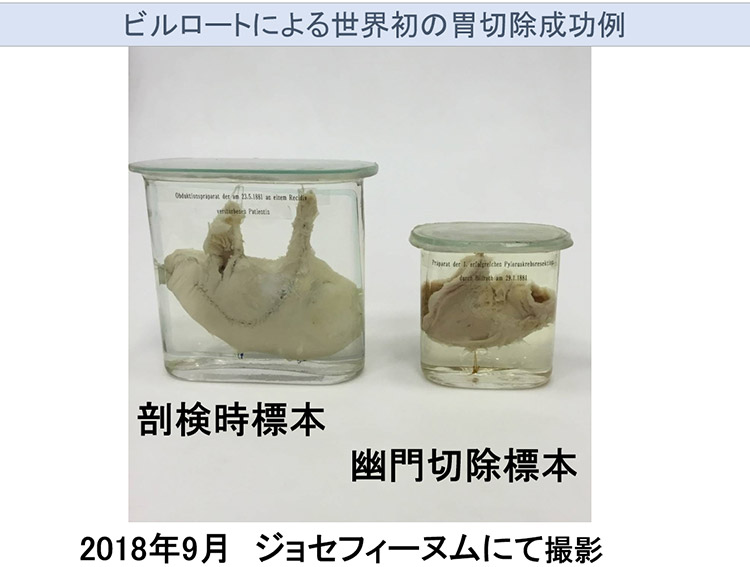
- PROFILE
- 医科学専攻
- Medical Sciences
- 消化器外科学分野 教授
- Department of Gastroenterological Surgery Professor
- 亀井 尚
- Takashi Kamei
1991年東北大学医学部卒、1999年東北大学大学院医学系研究科修了、大学院時代は、大阪大学の分子生物学教室でがん細胞の転移、運動に関係するスイッチ蛋白質の解析を行った。2016年より東北大学大学院医学系研究科消化器外科学分野教授。専門は一般外科、消化器外科学、特に上部消化管外科(食道・胃外科)、内視鏡外科学、外科代謝栄養学、生体侵襲学。最近はロボット食道がん手術を行いながら、大学病院の運営、地域医療の再編にも携わっている。
Graduated from Tohoku University School of Medicine in 1991, completed the Graduate School of Medicine at Tohoku University in 1999, and during graduate school, analyzed switch proteins related to cancer cell metastasis and motility at the Department of Molecular Biology at Osaka University. Since 2016, he has been a professor in the Department of Gastroenterological Surgery, Graduate School of Medicine at Tohoku University. He specializes in general surgery, gastroenterological surgery, especially upper gastrointestinal surgery (esophageal and gastric surgery), endoscopic surgery, surgical metabolism and nutrition, and surgical stress medicine. Recently, he has been involved in robotic esophageal cancer surgery, as well as in the management of university hospitals and the restructuring of community health care.
●関連リンク
消化器外科学分野(Department of Gastroenterological Surgery)
亀井 尚:tkamei*med.tohoku.ac.jp (「*」を「@」に変換してください。Please convert "*" to "@")
医局長(Medical Director) 谷山 裕亮:yusuketaniyama*med.tohoku.ac.jp (「*」を「@」に変換してください。Please convert "*" to "@")
